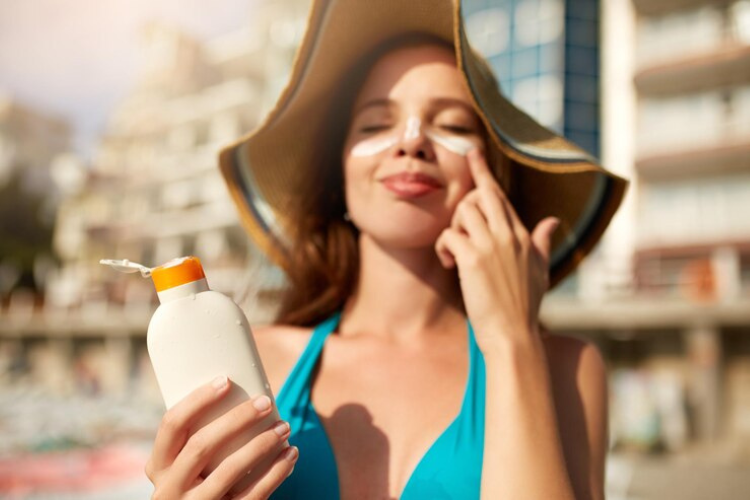
Sun block sunscreen is a skincare product that protects the skin from harmful ultraviolet (UV) rays of the sun. Regular use of sunscreen helps in preventing sunburn, skin damage, and early signs of aging. People of all skin types and all ages should use Sun Block Sunscreen daily, especially when going outdoors.
Why Use Sun Block Sunscreen
The main reason to use sunscreen is to shield the skin from harmful rays. The sun emits UV-A and UV-B rays. These rays can damage the skin’s surface and also penetrate deeper layers. UV-A rays cause early aging, wrinkles, and fine lines. UV-B rays are the main cause of sunburn. Both rays can increase the risk of skin cancer.
How Sunscreen Works
Sunscreen forms a layer on the skin that either absorbs or reflects UV rays. It contains ingredients that protect the skin by absorbing the rays and converting them into heat. Some sunscreens also contain physical blockers like zinc oxide or titanium dioxide that reflect the rays away from the skin.
Types of Sun Block Sunscreen
There are mainly two types of sunscreens:
-
Physical Sunscreen
This type sits on top of the skin and reflects sun rays. It is good for sensitive skin. It works immediately after application. -
Chemical Sunscreen
This type is absorbed into the skin. It works by absorbing UV rays before they damage the skin. It needs to be applied 15 to 20 minutes before going outside.
Choosing the Right Sunscreen
When buying sunscreen, it is important to choose one based on your skin type and the sun exposure you expect. Look for the following features:
-
SPF
SPF stands for Sun Protection Factor. SPF 30 or higher is recommended for daily use. A higher number means more protection. -
Broad-Spectrum Protection
It means the sunscreen protects against both UV-A and UV-B rays. -
Water Resistance
If you plan to swim or sweat, choose a water-resistant sunscreen. However, it still needs to be reapplied after 40 to 80 minutes.
Application Tips for Sun Block Sunscreen
To get the best results, sunscreen must be used correctly. Follow these tips:
-
Apply sunscreen 15 to 30 minutes before sun exposure.
-
Use enough product. An adult needs about one ounce to cover the entire body.
-
Apply on all exposed skin areas, including ears, neck, feet, and hands.
-
Reapply every two hours or after swimming or sweating.
Sunscreen for Different Skin Types
Different skin types may need different formulas:
-
Oily Skin
Use a lightweight, gel-based or matte-finish sunscreen. -
Dry Skin
Look for moisturizing sunscreens with hydrating ingredients. -
Sensitive Skin
Choose physical sunscreens that are fragrance-free and hypoallergenic. -
Acne-Prone Skin
Non-comedogenic sunscreens are best. They do not clog pores.
Common Myths About Sunscreen
There are many wrong beliefs about sunscreen. Let’s clear some of them:
-
Myth: Sunscreen is only needed on sunny days.
Truth: UV rays can pass through clouds. Use sunscreen even on cloudy days. -
Myth: Dark skin does not need sunscreen.
Truth: Everyone needs sunscreen. Dark skin also gets sun damage. -
Myth: One application lasts all day.
Truth: Sunscreen must be reapplied every two hours for continuous protection.
Sunscreen for Children
Children have delicate skin and are more prone to sunburn. Use sunscreens made for kids with gentle ingredients. Keep babies younger than six months out of direct sunlight. Use protective clothing and hats for them.
Sun Protection Beyond Sunscreen
Sunscreen is not the only way to protect your skin. Combine it with other methods:
-
Wear wide-brimmed hats.
-
Use sunglasses that block UV rays.
-
Wear long-sleeved shirts and long pants.
-
Seek shade, especially between 10 a.m. and 4 p.m.
Benefits of Regular Sunscreen Use
Using sunscreen every day has many benefits:
-
Prevents Sunburn
Sunscreen helps stop painful red skin caused by too much sun. -
Reduces Risk of Skin Cancer
Regular use lowers the chance of developing skin cancers, including melanoma. -
Prevents Premature Aging
Sunscreen protects against wrinkles, sagging skin, and dark spots. -
Evens Skin Tone
It helps prevent sun spots and keeps the skin tone clear and even.
Using Sunscreen in Daily Routine
Make sunscreen a part of your daily skincare. After cleansing and moisturizing, apply sunscreen. Even if staying indoors, apply it if near windows. If wearing makeup, choose products with added SPF or apply sunscreen before makeup.
Natural Ingredients in Sunscreen
Some sunscreens include natural elements:
-
Aloe Vera
Soothes and hydrates the skin. -
Green Tea Extract
Provides antioxidants and reduces inflammation. -
Cucumber Extract
Cools the skin and reduces redness. -
Shea Butter
Moisturizes and heals dry skin.
These ingredients are good for people who prefer gentle skincare products.
Conclusion
Sun block sunscreen is essential for protecting the skin from harmful sun rays. It helps maintain skin health, prevents burns, and reduces the signs of aging. It is important for all skin types and all age groups. Choose the right sunscreen for your skin, use it daily, and follow other sun safety tips for full protection. Regular use of sunscreen can make a big difference in long-term skin care and health.
Comments on “Importance and Benefits of Using Sun Block Sunscreen Daily”